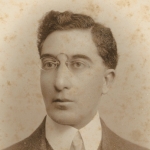The author has grown old. He is eighty now. He is a little surprised by the success of his prose and his poems, but as much by his longevity. Though his many stubborn beliefs—together with the approval of his readership—aid in the decline of his faculties. They have not yet failed completely, however. He recognizes that alongside the welcoming applause of the majority, there is the mild chill of the minority. The young are not interested in his work. Their movement is not his movement, their style not his style. They think and above all write differently. The old writer reads and studies their works open-mindedly but finds them inferior to his own. He considers the new school much less important—or at least not better—than his own. He believes that if he could, he would write in this new way. Though not now, obviously. It would take him eight to ten years to absorb the spirit of the new style—and it is almost time for him to go.
There are moments when he grows frustrated with their ideas. Why are they so important? A handful of young people who for some reason do not like his work? Millions admire him. But this makes him feel like he is going round in circles. He started this way, after all. He was one of fifty or so young people who developed a new idea, wrote in a different style, helped change the opinions of millions who revered a handful of the older generation and one or two out-of-fashion artists. (The deaths of the latter aided his cause greatly.) Thinking in this way, the old writer concludes that art must be a thing of vanity if fashions can change so quickly. Indeed, the work of these young people will be as ephemeral as his own—though this does not comfort him.
Reflecting further afield, he notes bitterly that from the age of forty or fifty the enthusiasms and artistry of any author begin to appear eccentric or risible. Maybe—it is one of his hopes—they will cease to be eccentric or risible aged one hundred and fifty or even two hundred. At that point, instead of appearing démodé, they are classic.
He also has doubts about the brazen and sometimes conceptual assessments he made in much of his criticism. Those writers he criticized when he was young and later replaced—maybe he wrote what he did because he could not sympathize with them—not owing to their lack of genius, but because the act of criticism is probably corrupted by contemporary concerns—fashion again. Superficially, his criticism resembles that which the young people of today write about him. His opinions have not changed—at least the major ones. Most of those old writers he would criticize today as he did sixty years ago. But this is not any great proof that his criticism is well-founded. It is only proof that, mentally, he is still the same young man.
There are moments when he grows frustrated with their ideas. Why are they so important? A handful of young people who for some reason do not like his work? Millions admire him. But this makes him feel like he is going round in circles. He started this way, after all. He was one of fifty or so young people who developed a new idea, wrote in a different style, helped change the opinions of millions who revered a handful of the older generation and one or two out-of-fashion artists. (The deaths of the latter aided his cause greatly.) Thinking in this way, the old writer concludes that art must be a thing of vanity if fashions can change so quickly. Indeed, the work of these young people will be as ephemeral as his own—though this does not comfort him.
Reflecting further afield, he notes bitterly that from the age of forty or fifty the enthusiasms and artistry of any author begin to appear eccentric or risible. Maybe—it is one of his hopes—they will cease to be eccentric or risible aged one hundred and fifty or even two hundred. At that point, instead of appearing démodé, they are classic.
He also has doubts about the brazen and sometimes conceptual assessments he made in much of his criticism. Those writers he criticized when he was young and later replaced—maybe he wrote what he did because he could not sympathize with them—not owing to their lack of genius, but because the act of criticism is probably corrupted by contemporary concerns—fashion again. Superficially, his criticism resembles that which the young people of today write about him. His opinions have not changed—at least the major ones. Most of those old writers he would criticize today as he did sixty years ago. But this is not any great proof that his criticism is well-founded. It is only proof that, mentally, he is still the same young man.
Translated from the Modern Greek

















Comment form: